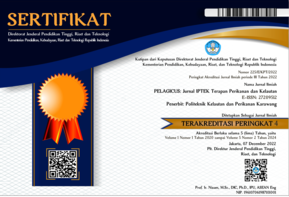Analysis of The Integrity of Attitudes, Behavior, Openness and Honesty of Captured Fisheries Enterprises for The Conservation of Fish and Marine Resources
Abstract
Keywords
Full Text:
PDFReferences
Anonymous. (2022). Penangkapan Ikan Ilegal , Tidak Dilaporkan dan Tidak Diatur serta Pendorong Terkait (Blue Paper). Retrieved from https://oceanpanel.org/wp- content/uploads/2022/05/HLP-BP-IUU-SDM-Bahasa.pdf
FAO (2016). Food and Agriculture Organization of the United Nations (FAO) Yearbook, Fishery and Aquaculture Statistics (2016). Available at http://www.fao.org/3/i9942t/I9942T.pdf .
Liandi, A., & Andryawan. (2022). Penerapan Hukum Terhadap Penangkapan Ikan Pada Wilayah Laut Indonesia Guna Menjaga Keberlanjutan Perikanan. In Seri Seminar Nasional IV Universitas Tarumanegara (pp. 229–239). Jakarta, Indonesia: Universitas Tarumanegara. Retrieved from https://lintar.untar.ac.id/repository/penelitian/buktipenelitian_10215006_7A2108220620 17.pdf
Maryani, H., & Nasution, A. (2019). Rekonsepsi Model Pemberantasan Illegal Fishing Di Perairan Indonesia (Analisis Perspektif Hukum Internasional). Jurnal Legislasi Indonesia, 16(3), 379–391.
Muhamad, S. V. (2012). Illegal Fishing Di Perairan Indonesia: Permasalahan Dan Upaya Penanganannya Secara Bilateral Di Kawasan. Politica, 3(1), 59–86.
Omstedt, A. (2023). How to develop an understanding of the marginal sea system by connecting natural and human sciences. Oceanologia, 65(1), pp 20-29
Saragih, M., Labaro, I. L., Pamikiran, R. D. C., Manoppo, L., & Silooy, F. (2022). Catch Per Unit Effort (CPUE) Perikanan Pukat Cincin Periode 5 Tahun Di Pelabuhan Perikanan Pantai Tumumpa. Jurnal Ilmiah Platax, 11(June), 1–5. Retrieved from https://ejournal.unsrat.ac.id/v3/index.php/platax/article/view/43527/40176
UNODC (2019). Rotten Fish A Guide On Addressing Corruption In The Fisheries Sector. United Nations Office On Drugs And Crime, United Nations,Vienna
Wurlianty, H. A., Wenno, J., & Kayadoe, M. E. (2015). Catch per unit effort ( CPUE ) periode lima tahunan perikanan pukat cincin di Kota Manado dan Kota Bitung. Jurnal Ilmu Dan Teknologi Perikanan Tangkap, 2(1), 1–8.
DOI: http://dx.doi.org/10.15578/plgc.v5i1.14060
Refbacks
- There are currently no refbacks.

This work is licensed under a Creative Commons Attribution-ShareAlike 4.0 International License.
E-ISSN: 2720-9512
ISSN: 2715-9620












